|
|
|
Sort Order |
|
|
|
Items / Page
|
|
|
|
|
|
|
| Srl | Item |
| 1 |
ID:
134055
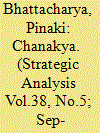

|
|
|
|
|
| Publication |
2014.
|
| Summary/Abstract |
At the outset, it is important to put on record the epistemological root of the reading of Chanakya's Arthashastra applicable to this commentary. The main text is from the translated volume by L.N. Rangarajan, titled Kautilya: The Arthashastra published by Penguin in 1992. Rangarajan has himself stated that he was guided by two versions of the original treatise of R. Samasastry and R.P. Kangle.1
|
|
|
|
|
|
|
|
|
|
|
|
|
|
|
|
| 2 |
ID:
134050
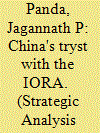

|
|
|
|
|
| Publication |
2014.
|
| Summary/Abstract |
Engaging with a multilateral body requires constructive foreign policy forethought, especially for a country that is not a fully fledged member of that body. China's overtures to the Indian Ocean Rim Association (IORA) exemplify this approach. The Indian Ocean and India are the two most immediate elements in China's policy approach to the IORA. With 20 member states, extra-territorial major powers as important dialogue partners, and the increasing importance of energy politics in the region, the IORA today is a significant multilateral body in China's calculus. Beijing's involvement with the IORA bespeaks the construct and strategy of a great power. For India, China's power construct in this matter poses three challenges: Beijing as a maritime power; Beijing as an economic power; and Beijing as a polygonal power.
|
|
|
|
|
|
|
|
|
|
|
|
|
|
|
|
| 3 |
ID:
134049
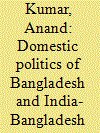

|
|
|
|
|
| Publication |
2014.
|
| Summary/Abstract |
The foreign policy of a country generally changes incrementally but in the case of Bangladesh it changes dramatically towards India depending upon which political party or alliance is in power. The ideological cleavage prevailing in the country affects not only its domestic politics but also its relationship with its neighbour India. In this article an attempt has been made to explain why and how the domestic politics of Bangladesh affects India-Bangladesh relations. It explores some of the historical processes that resulted in the formation of community consciousness among the Bengali Muslims. It also discusses the interests of different sections of society, such as the army and traders, who influenced the country's foreign policy in the post-liberation period as well as those who actively participated in the Liberation War of Bangladesh and who are pro-peasant and friendly to minorities. In this article the focus is on the domestic politics of Bangladesh. The main argument is that since there is no consensus in Bangladesh over how to best serve its national interest, the foreign policies of the two major political parties are completely different and allow the domestic politics of Bangladesh to affect the bilateral relationship with India in a way that is mostly independent of India's actions. It also suggests that India can only be insulated from Bangladeshi domestic politics after the delegitimisation of anti-liberation forces in Bangladesh, which could happen with the successful completion of the war crime trials.
|
|
|
|
|
|
|
|
|
|
|
|
|
|
|
|
| 4 |
ID:
134052
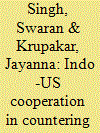

|
|
|
|
|
| Publication |
2014.
|
| Summary/Abstract |
The increasing dependence on Information and Communication Technologies (ICTs) has unleashed a whole new genre of cyber terrorism. Cyber attacks on critical infrastructure, online hate propaganda and use of the internet for recruiting, planning and effecting terrorist attacks have become new frontiers of terrorism. The ubiquitous cyberspace has expanded terrorism structures and transformed their operations. Given their democratic traditions of privileging basic freedoms, such as individual privacy, and the unprecedented spread of the internet, India and the US face a formidable challenge in confronting cyber terrorism. While both countries share a strong political affinity to cooperate and have set up institutional mechanisms to secure cyberspace, divergences in their approaches and a lack of clarity and consensus on their immediate and long-term goals continue to be their fundamental limitations. In spite of their strong commitment to work together, their divergent approaches to internet governance and episodes like the WikiLeaks and Snowden affairs have only re-enforced their continuing trust deficit.
|
|
|
|
|
|
|
|
|
|
|
|
|
|
|
|
| 5 |
ID:
134053


|
|
|
|
|
| Publication |
2014.
|
| Summary/Abstract |
On November 7, 1950, Vallabhbhai Patel wrote his celebrated letter to Jawaharlal Nehru on India's China policy. 'The Chinese Government has tried to delude us by professions of peaceful intention', he stated, referring to Beijing's decision to move troops into Tibet. A new challenge confronted India as a result of the 'disappearance of Tibet, as we knew it, and the expansion of China almost up to our gates'. 'Chinese ambitions … not only cover the Himalayan slopes on our side but also include the important part of Assam. They have their ambitions in Burma also', he added, noting (incorrectly) that 'Burma has the added difficulty that it has no McMahon Line round which to build up even the semblance of an agreement'.
|
|
|
|
|
|
|
|
|
|
|
|
|
|
|
|
| 6 |
ID:
134051
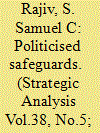

|
|
|
|
|
| Publication |
2014.
|
| Summary/Abstract |
This article examines Iranian contentions on three issue areas that exemplify the politicised nature of its interactions with the International Atomic Energy Agency (IAEA). These include access to military facilities, information credibility and the 'nuclear activism' of US-based non-governmental organisations (NGOs). Three drivers account for the emergence of such contentions: (1) multilateral and unilateral sanctions; (2) extended lack of progress at multilateral negotiating forums like the P5+1 and the E3/EU; and (3) organisational dynamics primarily related to the deterioration in Iran's interactions with the IAEA in the aftermath of the election of Yukiya Amano as the IAEA Director General (DG). Changes in dynamics in one or more of these factors, on the back of changes in domestic political leaderships (primarily in the US and Iran) and consequent modifications in their respective policy positions, have led to mutually agreeable outcomes like the November 2013 Joint Plan of Action (JPOA). In the context of 'politicised safeguards' losing some of their edge in the aftermath of the JPOA, the article closes by briefly examining the prospects of the IAEA drawing a 'broader [safeguards] conclusion' for Iran amidst the significant challenges that still need to be addressed.
|
|
|
|
|
|
|
|
|
|
|
|
|
|
|
|
| 7 |
ID:
134048
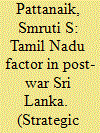

|
|
|
|
|
| Publication |
2014.
|
| Summary/Abstract |
Growing international concerns about human rights violations in the last phase of the Eelam war and the continued surveillance and intimidation of the Tamils in Sri Lanka have drawn the attention of their co-ethnics across the world. The southern Indian state of Tamil Nadu, which had detached itself from the political events in Sri Lanka after Rajiv Gandhi's assassination, has renewed its interest. In the post-war phase, the plight of Sri Lankan Tamils has become an emotive issue. Their grievances have been harnessed in recent years for political advantage by several political parties in Tamil Nadu. The politics of coalition has, in fact, made it difficult for New Delhi to pursue a policy independent of Tamil Nadu. This article examines how the Tamil-speaking people in Sri Lanka view the role of Tamil Nadu; their perception of the 13th Amendment; and India's options in post-war Sri Lanka
|
|
|
|
|
|
|
|
|
|
|
|
|
|
|
|
| 8 |
ID:
134041
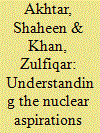

|
|
|
|
|
| Publication |
2014.
|
| Summary/Abstract |
This article explores the drivers of North Korea and Iran's nuclear aspirations and behaviour by employing the theoretical prisms of 'security dilemma', 'regional security complex' (RSC) and 'social constructivism'. It argues that ideational values and interests are shaping Iranian and North Korean nuclear aspirations and behaviour. Conversely, the absence of positive inter-subjective understanding of the US and its allies regarding Iran and North Korea is influencing their nuclear non-proliferation policy towards these states. The nuclear ambitions and diplomacy of North Korea and Iran could be better understood by looking at the role of ideational, security and structuralism models that are influencing their threat perception in the respective security complexes. Thus, addressing the ideational factors and security dilemmas of the two states can help in resolving the twin threats to nuclear non-proliferation in the 21st century.
|
|
|
|
|
|
|
|
|
|
|
|
|
|
|
|
| 9 |
ID:
134054
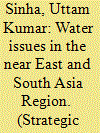

|
|
|
|
|
| Publication |
2014.
|
| Summary/Abstract |
With water concerns growing increasingly urgent, the global community will benefit from a treatment of the lessons learned and best practices in water dispute resolutions and approaches to water management. This report discusses the outcome of a working group of water experts from the Near East and South Asia (NESA) region,1 set up by the Strategic Studies Network, National Defense University, Washington DC. It is hoped that the findings and agreed-upon recommendations will add to the body of knowledge and sensitise policy-makers and governments to the challenges and opportunities that water presents. Some of the key questions discussed are:
|
|
|
|
|
|
|
|
|
|
|
|
|
|
|
|
|
|
|
|
|